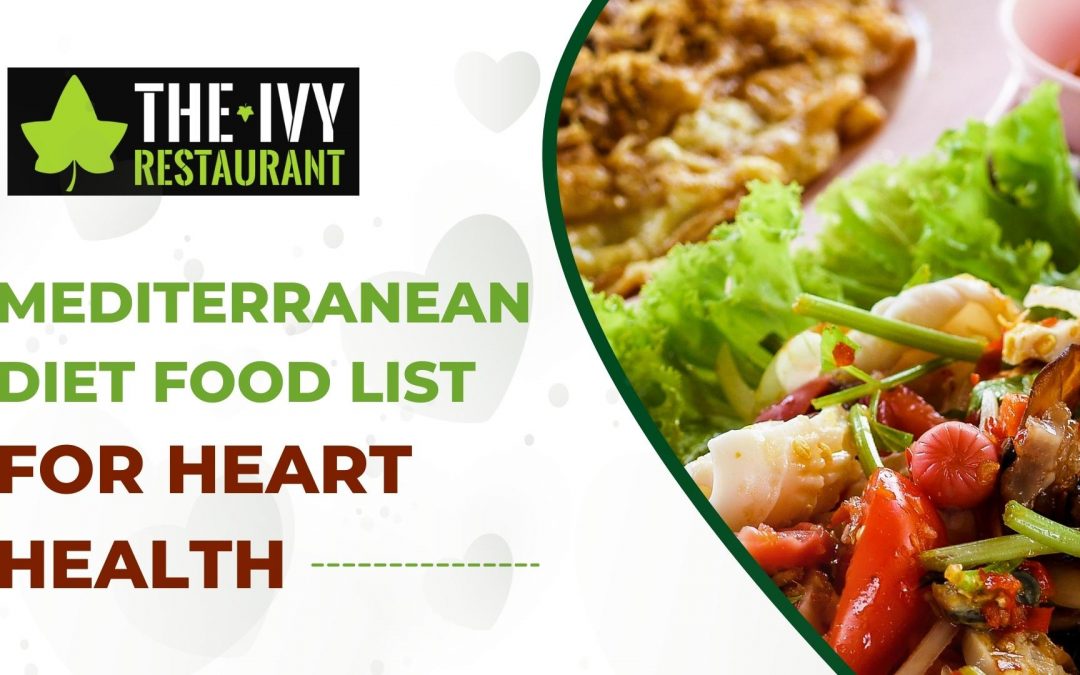The Mediterranean diet is equally delicious and nutritious, along with rich in flavorful ingredients like fruits, vegetables, whole grains, and fats for heart health. It has a variety of benefits and helps to support brain function, promote heart health, regulate blood sugar levels, and more. Although there are no concrete rules to follow the Mediterranean diet, there are many guidelines you can look for and follow to incorporate the principles of the diet into your daily routine. This article takes a closer look at what Mediterranean diet benefits include and which are the heart-healthy foods you can eat while on the diet.
Benefits of Mediterranean Diet Food
The Mediterranean diet links to a long list of health benefits. These are:
Promotes Heart Health:
The Mediterranean diet is studied extensively because of its ability to promote heart health. Study shows that the Mediterranean diet lowers the risk of heart disease and stroke. When compared the effects of the Mediterranean diet and a low-fat, it was reported that the Mediterranean diet is more effective at slowing the progression of plaque buildup in the arteries, which is considered as a major risk factor of heart disease. Further, the Mediterranean diet also helps to lower the level of diastolic and systolic blood pressure to support heart health.
Supports Healthy Blood Sugar Levels:
The Mediterranean diet contains a variety of nutrient-dense foods, including fruits & vegetables, nuts, seeds, whole grains, and fats for heart health. Following this eating routine helps in stabilizing blood sugar levels and protects against type 2 diabetes. Multiple studies have found that the Mediterranean diet reduces fasting blood sugar levels and improve hemoglobin A1C levels, a marker used to measure long-term blood sugar control. The Mediterranean diet also decreases insulin resistance, a condition that impairs the body’s ability to use insulin to regulate blood sugar levels effectively.
Protects Brain Function
Several studies show that the Mediterranean diet is beneficial for brain health and also protects against cognitive decline as a person gets older. One study, including 512 people, found that greater adherence to the Mediterranean diet is associated with improved memory and reductions in many risk factors for Alzheimer’s disease. The diet also lowers the risk of dementia, cognitive impairment, and Alzheimer’s disease. One large review also shown that following the Mediterranean diet improves cognitive function, attention, memory, and processing speed in healthy older adults.
Best Mediterranean Diet Food for Heart Health
Actually, which food belongs to the Mediterranean diet is controversial, as there’s variation between countries. The diet examined by most studies is high in healthy plant foods and low in animal products and meat. However, eating seafood and fish is suggested twice a week. The Mediterranean lifestyle also includes regular physical activity, sharing meals with other people, and minimizing stress levels. You can include the mixture of frozen, fresh, dried, and canned fruits and vegetables, but also check package labels for added sugar and sodium.
Olive Oil
Olive oil is one of the mainstays of the Mediterranean diet, used in everything from cooking to salads. Along with delicious, it also delivers impressive heart-healthy benefits. A compound called elenolide could be the reason behind olive oil’s heart-healthy properties. A study published in the Journal of the Science of Food and Agriculture found elenolide in the majority of more than 2,000 olive oils. Elenolide is characterized as an antihypertensive agent, which prevents high-blood pressure. The higher-quality the olive oil, the more elenolide is present. Further, olive oil consumption links to 17% reduced risk of cardiovascular disease and stroke.
Fish
Fish is a healthy protein source that delivers healthy fats, making it perfect for both the Mediterranean and a heart-healthy diets. Oily fish such as tuna and salmon, are rich in omega-3 fats, that improves blood lipid levels and lowers blood pressure. Shellfish such as shrimp also pack in protein, niacin, and selenium, that helps keep your heart and body running in tip-top shape.
Leafy Greens
There’s n chance that you don’t find the name of leafy greens in the diet food list for heart health. Leafy greens are one of the most nutrient-dense food around, meaning they pack a lot of nutrition into very few calories. These are high in fiber, potassium, and vitamin K, which regulates blood pressure and improves blood clotting. You can add spinach, lettuce, kale, collards, cabbage, or chard in the plate for additional benefits. Mediterranean diets are rich in vegetables, so you can try Greek-style Spinach Salad or Sautéed Broccoli & Kale with Toasted Garlic Butter as a dinner side.
Whole Grains
The Mediterranean diet is not a low-carb diet, but it focuses on healthier carbohydrates, including whole grains. As compared to refined grains, whole grains are full of fiber and nutrients necessary for heart health. Unrefined grains are the base of most Mediterranean meals be it bread, pasta, couscous, or barley. Mediterranean diet food recipe such as Lemon-Tahini Couscous with Chicken & Vegetables protects your heart delicious.
Tomatoes
From pasta sauce to caprese and more, tomatoes are as versatile as they are heart-healthy. These contain an antioxidant called lycopene that protect arteries from atherosclerosis and other forms of cardiovascular disease. Lycopene has also been associated to having healthier cholesterol levels. The potassium and antioxidants in tomatoes combines to reduce blood pressure and stroke risk.
Beans
Beans are a versatile protein source and feature mostly in the Mediterranean diet as it prioritizes eating plenty of plants. As beans contain fibers, eating them helps in lowering cholesterol because – for every 7 gms of fiber a person will eat daily, heart disease risk will drop by 9%. That’s due to the ability of fiber to sop up excess cholesterol in the system and ferry it out before it clogs your arteries. You can add chickpeas to your salad, enjoy lentil soup or use hummus as a dip for vegetables.
Nuts & Seeds
Nuts contain heart-healthy fats, vitamins, and minerals. Having nuts in your diet and eating it regularly promotes heart health as there’s substantial evidence that regular consumption of nuts reduces the risk of coronary heart disease. In a 2019 meta-analysis in Nutrition Review, there was an inverse relationship found between nuts consumption and several heart conditions. That means the more regularly, people will eat nuts, the lower their risk of coronary heart disease and other cardiovascular conditions. Like other foods in the Mediterranean diet, nuts are also full of antioxidants that give a heart-healthy boost. Grab a handful of snacks, use it to add some crunch to your salad plate and crush it up to make the Roasted Pistachio-Crusted Salmon with Broccoli.
Berries
Last but not least, berries are a staple of both the Mediterranean and heart-healthy eating patterns. These are full of potassium, vitamin C, and fiber that keeps your blood pressure and arteries healthy. Eating berries, such as blueberries links to significant improvements in cholesterol, blood vessel function, and blood clotting. Mix the berries into smoothies or top a yogurt parfait with them. If fresh berries can’t be found easily or are out of season, try frozen. They’re as healthy as fresh, just check the labels to ensure there’s no added sugar. A recipe you can try while on a Mediterranean diet is Fresh Berries with Warm Tequila-Lime Foam.
Foods to Avoid in Mediterranean Diet
While there’s a lot of foods that are recommended to take while following the Mediterranean diet either heart-healthy or some with other benefits.
There are some processed foods and ingredients you should avoid. These include:
- Added Sugars: It is found in many foods but specifically high in soda, candies, ice cream, table sugar, syrup, and baked goods.
- Refined Grains: Pasta, White bread, tortillas, chips, and crackers
- Trans Fats: It is found in margarine, fried foods, and other processed foods
- Refined Oils: Canola oil, soybean oil, cottonseed oil, and grapeseed oil
- Processed Meat: Hot dogs, processed sausages, deli meats, and beef jerky
- Highly processed foods: Convenience meals. Fast food, microwave popcorn, and granola bars
Final Words
The Mediterranean diet is one of the healthiest around for various reasons. If you want to eat heart-healthy food, many of its principles have relevancy. Mediterranean diet food is associated with numerous health benefits and helps in promoting heart health, stabilizing blood sugar levels, enhancing brain function, and more.
To get started, you can try to eat these foods packed with fiber, nutrients, and healthy fats to make your healthy eating taste great. Best of all, you can adapt the Mediterranean diet in a way that works for you. If you like sardines and salmon but whole wheat pasta and olive oils are your favorites, try delicious Mediterranean-inspired meals with foods you love. If not yet, you can incorporate more fruits and vegetables into your meals and snacks during the day as it’s a great way to get started on the Mediterranean diet. You can also add a side salad or steamed veggie dish to your main meals and enjoy a fresh piece of fruit for dessert!



Recent Comments